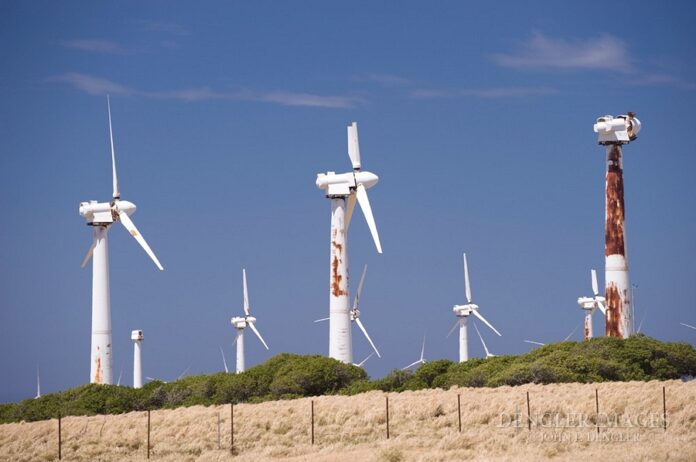Hawai’i’s efforts to meet the Hawai’i Clean Energy Initiative’s goal of 70 percent carbon dioxide emission free energy by 2030, and 100 percent by 2045 is running into numerous difficulties.
Gov. David Ige has bragged Hawai’i, with no oil, natural gas, or coal reserves, is “blessed with abundant renewable energy resources – solar, wind, ocean, geothermal – that can be the foundation for a robust alternate energy industry” which can be “as significant for Hawai’i’s economy as tourism.”
Fossil Fuels Dominate Electricity
As of 2019, petroleum-fired power plants still supply 63 percent of electricity generation, and coal fuels another 12 percent.
Renewable energy sources, mainly biomass, geothermal, hydropower, solar, and wind, supplied a combined 21 percent of the electric power in Hawai’i in 2019. Of these, solar has seen the largest increase in recent years as a result of the growth in rooftop solar panel systems.
Ninety-five percent of the state’s residents receive their electricity from three electric power utilities owned by Hawaiian Electric Industries Inc. that operate on five of Hawai’i’s islands.
News reports in Hawai’i indicate citizen opposition to the siting of large solar and wind industrial facilities near densely populated areas has resulted in the cancellation of several projects intended to meet the state’s carbon dioxide free energy goals.
For example, in mid-2020, Eurus Energy America announced the cancelation of its proposed 46.8 megawatt (MW) Palehua wind project on Oahu.
“The risk factors associated with developing wind projects in Hawaii were deemed too great for us to proceed,” the company said in a statement announcing the decision.
Pressure on state and local governments has also resulted in the Hawaii Legislature and the Honolulu City Council considering restrictions on where wind projects could be developed.
These and similar developments are complicating the task of decarbonizing Hawai’i’s electric grid.
Battery Bonus Blues
Under Hawai’i Electric’s “Battery Bonus” program, the company pays cash incentives to customers on Oahu who add energy storage, battery packs, to an existing or new rooftop solar system. But the program’s success is being stymied by slow processing of required building permits by the Honolulu Department of Planning and Permitting (HDPP).
The Public Utilities Commission (PUC) has capped the program at a total of 50 MW supplied from battery storage. Customers approved for the first 15 MW receive a taxable “battery bonus” of $850 per kilowatt (kw), as determined by the HDPP. Those winning approval for the second 15 MW get $750 per kw with the final 20 MW getting $500 per kw.
Customers must work with a solar contractor to add storage to an existing system or install a new solar-plus-storage system.
Through September, the HDPP had approved only 143 of 334 applications for installation, with the rest in various stages of review.
Biomass is a Bio-Mess
Independent power producer AES Hawaii, under pressure to stop using imported coal, has proposed converting its coal-fueled power plant to use “renewable” tree-burning biomass at the facility. Under the controversial proposal, which technically could move Hawai’i 27 percent closer to achieving its 2030 goal, AES would import biomass through Kalaeloa Harbor.
Practical difficulties for the project include the fact that the proposal, is no longer favored by the Hawai’i State Energy Office, because research indicates burning biomass, or plant matter packaged into pellets, produces as much or more greenhouse gases and toxic air emissions per kilowatt-hour (kwh) of electricity generated than burning coal.
In addition, AES faces the need to obtain a power purchase agreement that could win approval from the PUC – and survive lawsuits. Also, any harbor infrastructure modifications would likely trigger an environmental review and a host of federal and state permits and consultations. In addition, a switch from coal to biomass would likely require Hawaiian Electric to secure a new power purchase agreement with renegotiated prices for electricity and PUC approval.
‘Virtue Signaling With No Virtues’
Hawai’i’s troubles with its renewable energy mandates exemplify the “fatal conceit” of central planning that has been responsible for enormous amounts of damage to people over time, says Dan Kish, distinguished senior fellow at the Institute for Energy Research.
“The huge investments to achieve the planners’ lofty, yet meaningless, goals will guarantee skyrocketing prices for energy,” said Kish. “Wood is certainly not carbon free, and almost no energy source is: even dams and nuclear power plants require huge life-cycle carbon emissions because of the large amount of input materials, all of which are energy intensive.
“This is virtue signaling with no virtues, yet it is the kind of meaningless gesture at the core of the Biden administration’s war on affordable energy, which is driving costs higher and higher with no return in environmental performance,” Kish said.
Hawai’i’s zero emissions energy plan ignores the fact it will increase costs, while simultaneously undermining the reliability of the power supply, says John Droz, founder of the Alliance for Wise Energy Decisions.
“The criteria for what is a wise energy decision ultimately rests on how it does in meeting the two primary criteria for the Grid: low cost and high reliability,” said Droz. “All indications are that a switch from coal to biomass is significantly more expensive per KWH of generation.
Their counter argument is coal is a CO2 ‘polluter,’ but biomass also produces substantial CO2.
“Solar, too, has numerous environmental and economic liabilities that are being ignored by the virtue signalers,” Droz said. “In addition, it is not dispatchable because it is woefully intermittent.”
Duggan Flanakin (dflanakin@gmail.com) writes from Austin, Texas.


























